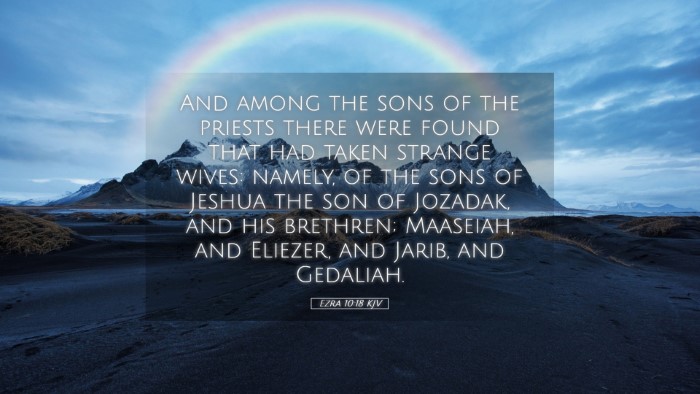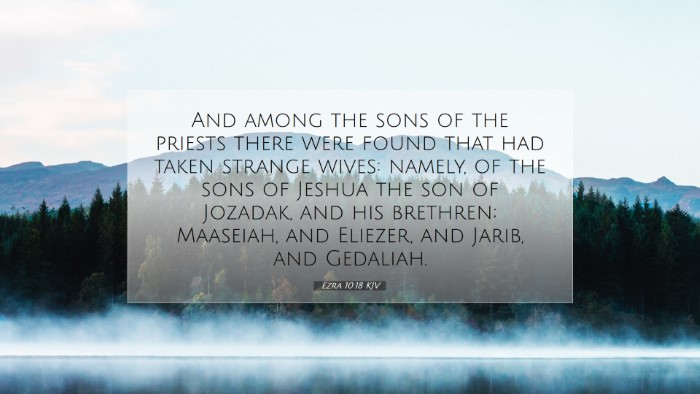Commentary on Ezra 10:18
Ezra 10:18 states: "And among the sons of the priests there were found that had taken strange wives; namely, of the sons of Jeshua the son of Jozadak, and his brethren: Maaseiah, and Eliezer, and Jarib, and Gedaliah."
Context and Background
The book of Ezra is critical in the post-exilic recovery of Israel. This passage occurs as Ezra returns to Jerusalem after the Babylonian exile with a group of exiles. Ezra’s mission was to restore the community’s religious practices and ensure adherence to the Law of Moses.
In the preceding chapters, we see the restoration of the temple worship, and now Ezra is faced with a moral crisis: many Israelites have intermarried with foreign nations, leading to spiritual dilution and disobedience to God's commands.
Analysis of the Characters
In this verse, the focus is on the priests and their transgressions. The mention of "the sons of the priests” signifies the failures of those entrusted with maintaining the holy standards of worship.
- Jeshua the son of Jozadak: As the high priest, Jeshua is a pivotal figure representing priestly authority. His lineage underscores the severity of the issue since the priests were expected to lead by example.
- Maaseiah: An important priest during this period, Maaseiah’s involvement indicates systemic issues within the priesthood.
- Eliezer, Jarib, and Gedaliah: These priests symbolize the failure of multiple generations to uphold the covenant, showcasing a deeper societal concern about marital alliances with foreign women.
Theological Implications
This passage raises significant theological questions regarding holiness, purity, and the consequences of disobedience. The act of marrying foreign women is not simply about intermarriage; it represents a departure from covenant fidelity.
As noted by Matthew Henry, this highlights the danger of spiritual compromise, where the chosen people allow secular influences to infiltrate their community. The specific mention of foreign wives suggests a corruption of worship through syncretism.
Albert Barnes emphasizes that these marriages led the people away from the worship of Yahweh, illustrating the broader principle that relationships can significantly impact faith and practice. This connects to the broader biblical theme of covenant faithfulness that runs throughout the Old Testament.
Call to Repentance
The identification of priests who had taken strange wives serves as a precursor to the corporate repentance that Ezra will call for. The seriousness of their sin is compounded by their positions, as spiritual leaders are held to a higher standard.
Adam Clarke interprets this situation as a divine warning. The priests' involvement in marrying foreign women indicates a need for a purge of unholy affiliations within the leadership, alluding to God's serious warnings regarding idolatry and intermarriage throughout Scripture.
Lessons for Today’s Church
This verse serves as a call to examine the purity of the church’s spiritual practices. Just as Ezra confronted the leaders on their actions, today’s pastors and leaders must be vigilant against influences that could compromise the gospel.
- Leadership Responsibility: Leaders must exemplify a faithful commitment to God. Their lives should reflect a dedication to purity, both personally and within the community.
- Discernment in Relationships: Believers today are reminded to approach relationships—especially marriages and partnerships—with an understanding of spiritual implications.
- Call for Repentance: Just as Ezra initiated a process of repentance, churches must regularly call members to a deeper commitment to holiness and covenant faithfulness.
Conclusion
Ezra 10:18 provides profound insights into the nature of faithfulness, leadership, and the communal responsibility for maintaining holiness. By examining the failings of the priests and their immediate consequences, modern readers are urged to consider the weight of their commitments and the importance of safeguarding spiritual integrity in both personal and corporate contexts.
Through this lens, Ezra’s commitment to restoring God’s standards serves as a timeless message for believers, prompting a reflection on fidelity, purity, and the community's collective journey towards holiness.


